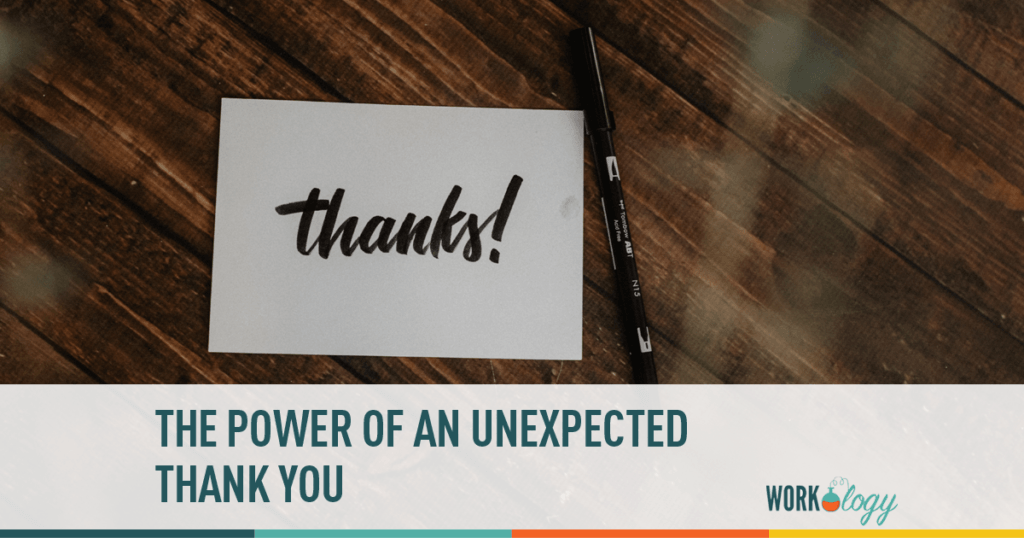They say that a job well done is its own reward, but still you should know how much your hard work means to those around you. Thanks for doing such a good job.
That little Hallmark saying was on a card that a colleague of mine recently received from his senior vice president (and direct manager). A small meeting was interrupted by this SVP in order to say, “thanks” and present him with a small token of appreciation. WOW. How would you feel if your boss surprised you with an unexpected thank you? I’d feel pretty damn good, that’s for sure!
A LITTLE THANKS GOES A LONG WAY
In our rush to get to meetings, send emails, update our Facebook status and cross things off to-do lists, we can often forget how much we rely on other people to get through our days. The person who makes your triple non-fat no-whip latte just the way you like it. The co-worker who stayed late and missed dinner with his family to help you with a project. The nanny who pulled extra hours to keep your kids safe while you were out of town on business. The person who passed your name along to a recruiter.
When was the last time you sent a thoughtful thank you?
I’m not saying that I am perfect when it comes to thank yous. In fact, as I write this, I am thinking about the thank you cards that I need to write. Yes, need to. It’s important to me that others know how much their kind gestures, hard work or time truly means to me. Appreciation is a powerful tool when it comes to building relationships, engaging our teams and … well … becoming better people.
HOW TO SEND A THOUGHTFUL THANK YOU
The colleague mentioned at the beginning of this post received a $100 gift cheque in his card. While a monetary thank you is certainly an fond idea … it’s not necessary in order to truly express heartfelt thanks. When I was doing more direct recruiting, from time to time, I’d receive a nice card with a hand written note. My favorite was from a college student that had a picture of a bulldog on the front and “Go Dawgs!” on the inside; that card was received nearly 10 years ago and I still vividly recall it.
If someone has offered you their time, expertise, an interview or a job … sending a thank you should be on your to-do list. What you write is up to you, but my advice is to:
- Be sincere
- Keep it legible
- Use proper grammar, and
- Send it in a timely fashion.
NOT SAYING THANK YOU HAS POWER, TOO.
Recently in a job discussion via a LinkedIn group, someone posted an article advising job seekers NOT to send post-interview thank yous. That is the single worst piece of job seeker advice I have ever seen. Thankfully the community came together and squelched that awful advice, and instead offered really great insights. Several recruiting pros even admitted that if all things were equal between two candidates, thank you notes became THE deciding hiring factor.
What’s your take on sending “Thank You Letters” ? For job seekers, have you gotten a job because of the post-interview follow-up and for recruiters, have you given someone a job because of it? Let us know.










6 Comments
Thanks for sharing this, Shannon.
Throughout my career in HR a thank you has been the difference between recommending a candidate (or not) to the hiring manager in more instances than I can recount. Rather you have the job or not, it’s always good to reach out with a thank you.
Good post.
Best,
Rory
Hi Rory — Thanks so much for taking the time to read and comment. Sometimes it’s the seemingly “little things” that truly make the difference. Have a great day. — Shannon
I can’t believe someone would encourage a job seeker to NOT send a thank you! That is the worst advice I’ve ever heard. Now if the advice was don’t send a generic (copy and paste) thank you card–I’d be on board with that. I wrote a blog post last year that relates to your post, it expands on different ways to say thanks. (http://studentbranding.com/how-do-you-say-thank-you/) Love your advice on thankful thank yous. I think we need to think a little more about how we say it/pay attention to how people like to be recognized as well.
Hi Sejal — I was going to link to the bad advice; it actually came with a video, too! Thanks for sharing your link, I will be sure to check it out. 🙂 Shannon
Great advice, as the art of a well-placed thank you is dying it increases though power of those thank yous.
Hi Nick — Thanks for reading and taking the time to comment. I appreciate it. — Shannon
Comments are closed.